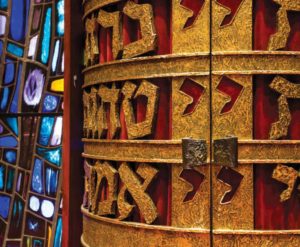The oldest kid on the interfaith block is also the newest. As an Orthodox rabbi—and one who leans more to the traditional right within Orthodoxy than the more liberal left—my community is the last and most hesitant to join what others have been doing for decades.
Within the Jewish world, we occupy a similar position to evangelicals in the Christian universe. We are seen as far more engaged with religious observance and practice than our other Jewish brothers and sisters. We see Scripture as an accurate and normative expression of the Divine Will. Our families are far larger, and our rate of retention of young people is off-the-charts higher than others. Like evangelicals, we are frequently maligned by those who wish that our version of practice disappeared because it makes them uncomfortable, having bet the barn decades ago that Orthodoxy could never, ever be successfully transplanted to America. Like evangelicals, we are thriving in this great country. While we represent no more than 10 percent of American Jews, among the youngest cohort usually measured by the polls we are already the single largest group. Many people, looking at the unhappy convergence in the non-Orthodox community of a birth rate below zero population growth and a skyrocketing out-marriage rate, believe that in just a few decades we will not only be the last Jews standing outside of Israel, but the only ones.1
The miracle of Orthodox regeneration after the Holocaust was achieved the same way other groups succeeded: inspired leadership, hard work, and self-sacrifice. In our case, one other factor was crucial: our own educational system. Our children take their faith seriously because they spend half their day or more studying it from the earliest ages in Orthodox schools. Among many other things, these schools put them in touch much more intimately with Jewish history. Memory is elevated to the level of mitzvah—of commandment. Because so much of that history in the last two millennia is stained in blood, much of which was shed by Christians acting in the name of Christianity, Orthodox Jews are often more suspicious of Christians than others. They remember the auto-da-fes, the forced debates, the weekly harangue they were forced to listen to in the synagogue. They remember that John Chrysostom was not so golden-tongued when it came to the Jews. Nor was Martin Luther, nor the Romanian prelate asked to intervene against a scheduled shipment of innocent Jewish children to a death camp. (He told Rabbi Michoel Ber Weismandel, “There are no innocent Jewish children. You must all die for that sin.”)
Orthodox Jews are particularly suspicious of Christian intentions, thinking that behind easy smiles lurk missionary zeal. Most Jews—Orthodox or not—shut down when they learn of any association between Christians they deal with and groups that proselytize to Jews. The Orthodox are often even more demanding. They put the burden of proof on any rabbi involved in serious conversation with Christians to demonstrate that the encounters are free of any taint of a conversion agenda.
Yet in some ways, the trip has been more rewarding because of—not despite—my Orthodoxy. Bonding between Orthodox Jews and evangelicals is often instantaneous, as each party recognizes and appreciates the love of G-d and His Word that the other wears on his/her sleeve. Orthodox Jews do not react in horror at the idea of others praying for their salvation. Because they pray three times a day, they are comfortable with G-d deciding how to respond to whose prayer, and confident enough in their own tradition about eternity that they are not fazed by would-be gatekeepers to the Kingdom of Heaven who sometimes tell them that they are going to be locked out. (On the other hand, because they firmly believe in an afterlife, they do have their doubts about whether people who think Jews must head straight to Hell after they die can really respect them while they are still breathing. It is an area that requires some more thought.)
Conversation between evangelicals and Orthodox Jews flows smoothly, without as many cul-de-sacs in which it can be mugged. While some Jews are offended by in-your-face citation of Scripture by evangelicals, Orthodox Jews simply respond with a verse from their own Scripture. While views on abortion, contraception, and end-of-life issues do not coincide, Orthodox positions are much closer to evangelical ones than those of other Jews. After a short while, both parties in this interfaith relationship realize they are not going to make any headway winning over the other, and just agree to be friends—sometimes very good friends.
I have learned a good deal in my association with evangelicals, some of it shaking up thinking that became embedded in Jewish society after hundreds of years of Christian persecution and contempt. Some Jews, especially those only one degree of separation from Holocaust survivors betrayed by their former friends and neighbors, grew up believing that if you scratch the surface of any non-Jew, you will find some anti-Semitism. I have learned that there are many, many non-Jews free of such a taint, and many Christians in particular who love Jews. I have learned that for many decades, the single largest and most reliable group of allies of the Jewish State are Christians, especially evangelicals. I have discovered that the majority of this support does not flow from apocalyptic visions of mass conversion of Jews in the Holy Land as a precursor to the Second Coming, but from taking the Bible seriously. (It is not only dispensationalists and Christian Zionists who are high on Israel. Many evangelicals who are neither still find something biblical about the return of the Jews to their homeland, and the way they made the desert bloom, whether by drip-irrigation, or turning it into a Middle Eastern Silicon Valley.)
Perhaps most importantly, I have seen these things so clearly, that I have been able to take these findings on the road, and as an insider, speak to Orthodox groups, persuading them that indeed things have changed with millions of Christians.
Orthodox Jews can reciprocate to evangelicals. Traditional Jews spend more time wringing meaning out of the first five books of the Bible than any other. For a variety of reasons, those are the books that Christians devote the least attention to. Jews are holding on to literally thousands of years of commentary and insight about the Word of G-d, a good deal of which is relevant to all believers. (British former Chief Rabbi Lord Jonathan Sacks demonstrated that much of it is relevant even to nonbelievers; he consistently ranked among the ten most admired people in the UK.) Evangelicals, already open to exploring the roots of Christianity in Judaism, will be delighted by the way two, three, often four generations of Jews will sit around a Shabbat table—each and every week—trading insights into the subtleties of expression in the Hebrew Bible and how they enlighten us.
Exploring Jewish law will also enrich evangelicals. Many have asserted that the most fundamental difference between Christianity and Judaism is whether faith or actions are dispositive in achieving eternity. Besides being simplistic, it is downright wrong. Jews (for whom faith is a sine qua non of action) do not believe they have a monopoly on achieving eternal grace. The Talmud argues that the “righteous of the nations of the world have a portion in the World to Come,” and that this righteousness is defined by adherence to no more than seven commandments (including prohibitions against murder, theft, blasphemy), no more than one of which is affirmative. In other words, traditional Judaism never argued that the Law was the high road to Heaven. It was mandatory for Jews, but non-Jews could do just fine without it. (Paul’s message, it turns out, was more Jewish than people know.)
But G-d’s laws are never arbitrary. They are redolent with meaning and significance. The ethos that animates each law is often relevant to non-Jews. They may not need the strictures of the law, the constant attention to detail and all its limitations. But they certainly will be enriched by studying the telos of the Law, by the lessons in each law that Christians are free to apply to their lives on their own terms, when and where they want to. Those laws are closed to them without assistance from those who spend many years studying them full time. Simply put, evangelicals need the Orthodox in order to appropriate the ethos of the Law.2
I like to think of all this as demonstrating that the tree on to which Gentiles are grafted is not in a state of suspended animation, awaiting its quickening in the end of days. That tree is alive and vital, with precious sap in it, whose flow is necessary to bring the world to a consciousness that will welcome the Redeemer (we’ll agree to differ as to his identity) when he comes.
Another area that Orthodox Jews and evangelicals can and should explore is putting the power of faith to work to better our communities—materially and spiritually. History pitted us against each other; today, the greater enemies—skepticism, agnosticism, atheism—ought to bring us together to make common cause of showing the world how people who are “G-d intoxicated”3 have a leg up on their neighbors in regard to charitable contributions, voluntarism, family stability, and their ability to deal with moral nuance. At the Simon Wiesenthal Center where I work, we call this cooperation “multi-faith” rather than “interfaith” work.
This exploration is new and tentative. In the Orthodox world, it needs to be enlarged, pulling into the dialogue carefully prepared individuals. On the evangelical side, a number of issues threaten the young relationship. Proselytizing to Jews as Jews (particularly the kind that uses deception, such as missionaries dressed like Hasidic Jews) remains a huge obstacle. Some in the Christian world have argued that after centuries of abusing Jews, Jews should be allowed a bit of space. Another huge issue is Replacement Theology, responsible for centuries of contempt for Jews and for their deaths. Largely through the urging of Palestinian Christians who do not want to see any link between the Bible and contemporary Jews, supersessionism and replacement theology have made a comeback in the last years. Jews cannot stop it. It will take evangelical thinkers and writers to develop a theology true to Christian teaching but that leaves room for the significance of Jews and Judaism even before the end of times.
I try to speak in as many Christian venues as possible, particularly in the seminaries that are training the next generation of leadership. For strong advocates of the State of Israel like myself, this kind of appearance is crucial. Too many Christians encounter Judaism—even favorably—only through the printed word, but do not come face to face with passionate, committed observant Jews. That cannot augur well for the place of Jews in this country, or the way Israel is perceived by non-Jews. I hope and pray that more doors will open up in the future, through which we can walk together, despite theological difference, united in our commitment to G-d.
ENDNOTES
1Uriel Heilman, “Pew Survey of U.S. Jews: Soaring Intermarriage, Assimilation Rates,” October 1, 2013, JTA The Global Jewish News Source: http://www.jta.org/2013/10/01/news-opinion/united-states/pew-survey-u-s-jewish-intermarriage-rate-rises-to-58-percent.
2Particularly useful is a delightful little book by a young Catholic professor and mother who lived in an Orthodox neighborhood in Pennsylvania: Maria Poggi Johnson, Strangers and Neighbors: What I Have Learned about Christianity by Living among Orthodox Jews (Nashville: Thomas Nelson, 2006).
3This was Immanuel Kant’s take on Spinoza. I would disagree about the application, but still like the phrase.


